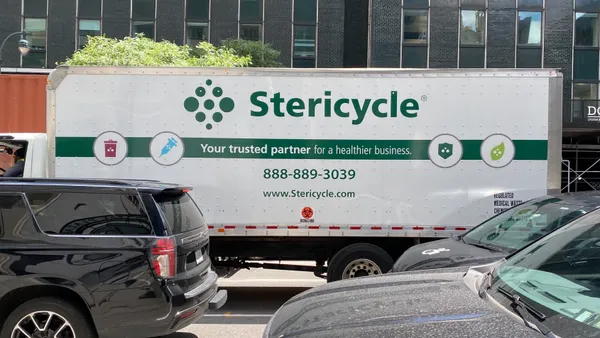UPDATE: Omaha, NE officials are considering a study to determine the environmental impact of yard waste disposal methods and assess the best way to handle yard waste. The study will take months to complete and cost less than $100,000, according to Public Works Director Bob Stubbe.
The Public Works Department may also conduct a survey on Omaha residents to determine how they would like their yard waste to be handled, according to Omaha.com.
While such long-term decisions are being made, it is still unclear how yard waste will be handled this summer. "The choice this summer, right now, is to co-collect (trash and yard waste) again, or have delays on yard waste being picked up — sometimes three, four, five days ... The citizens won’t want that," said Mayor Jean Stothert to Omaha.com.
Dive Brief:
- Waste Management has submitted two revised waste collection proposals to the city of Omaha, NE aimed to address complaints about current services and to plan for the future. The current contract runs through 2020, as reported in KETV. Both proposals include an upgrade in recycling carts and upgrade to the city's fleet, and indicate that recyclables will be picked up every other week.
- One proposal includes the elimination of separate yard waste collection, leading to the elimination of composting — a decision that Mayor Jean Stothert supports, but others find to be environmentally irresponsible. The other proposal would keep the current system for trash and yard waste, using cans and bags provided by Omaha.
- The mayor is seeking feedback from the community regarding the proposals, as any changes in waste collection will come as a cost to customers.
Dive Insight:
The co-collection of trash and yard waste began the summer of 2015 in response to complaints of delayed pickup when these materials were being handled separately. The decision to hauling the yard waste to the landfill along with the trash, when it was formerly sent to a compost site, was intended to be a temporary way to address the issue, but Omaha Mayor Jean Stothert is happy with the new plan and has decided it’s a keeper.
"There are many long-term financial and environmental benefits to co-collection of yard waste. Increasing the amount of yard waste will increase power production. I believe this has greater 'green' benefits than manufacturing compost," she told KETV, adding, "We do need to modernize. I feel like our current service is way outdated."
Removing compost from the equation is the best waste management answer as far as the mayor is concerned, resolving logistical problems while providing feedstock to produce volumes of energy. Conversely, others have made a major effort to bump up composting, arguing it is cleaner than producing gas on a more open landfill.
Chino, CA has dug deep into this alternative for handling green waste, with the goal of producing 50,000 tons of 100% organic compost annually. Though statewide, Governor Jerry Brown has signed composting laws to move California to its 75% recycling goal by 2020.









